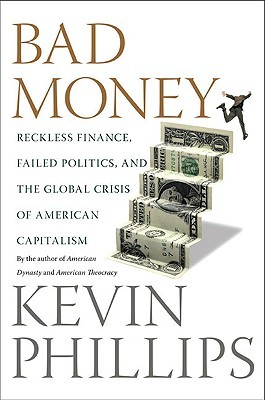

| BAD MONEY Reckless Finance, Failed Politics, and the Global Crisis of American Capitalism Kevin Phillips New York: Viking Penguin, 2008 |
Rating: 5.0 High |
|||
| ISBN-13 978-0-670-01907-6 | ||||
| ISBN-10 0-670-01907-0 | 239pp. | HC/GSI | $25.95 | |
Gobsmacked by the deepest economic downturn since 1929's Great Depression, most U.S. citizens do not need reminding that the elite financial institutions of Wall Street have (somewhat like Mr. Magoo) done it again. The housing bubble, which burst in the fall of 2007, thanks to complex machinations by the elite of The Street, grew into a general crisis of credit that sent American unemployment rates soaring toward (or past) 10 percent, weakened the dollar, and drove foreign state-owned oil companies (such as Saudi Aramco) to consider basing their trading on stronger currencies like the Euro.
No one in this country is unaware of the downturn. But too few truly understand it. This book by Kevin Phillips (his fourteenth) is therefore worth reading for a deeper insight into the matter and where it may lead America and the world.
Phillips has been reporting on the state of economics for three decades. In this book, he pulls no punches in laying blame for the debacle, naming both Bush pére and Bush fils, along with Ronald Reagan, Bill Clinton, Alan Greenspan and Ben Bernancke (among others.) The book also reveals his thorough scholarship and depth of historical insight. Insight is what the situation demands because, as Phillips notes, the profusion of market make-believe was designed to be hard for outsiders to fathom — and even many insiders failed to grasp the dire implications of so much unquantified risk resting on such untried instruments. Phillips, with clear analysis and frequent colorful descriptions, penetrates the intentional obscurity.
The crisis had multiple causes, but the central ones were heedless greed on Wall Street's part (though some saw and warned) and heedless laxity on the part of government. This resulted in the proliferation of arcane and increasingly risky financial experiments which, because they were based on underexamined algorithms and overestimated aggregate credit-worthiness, became houses of cards that ultimately collapsed and would have taken the entire banking system with them but for the (belated) intervention of GW Bush and then President Obama.
Phillips lays all this out with detailed explanations augmented by 27 figures depicting the performance over time of some economic parameter. A notable example is his treatment of the consumer price index (CPI) which the government in the 1990s altered with the effect of understating inflation from that point forward by 3 percent (or about half.)1
Ideology played a part, in fundamentalist anticipation of the End Times which devalued the long view, and in "Prosperity Gospel" promoted by several megachurches. "God wants you to be rich," the Gospel proclaimed, reinforcing Republican doctrine which favored tax cuts for the wealthy; they could thus lavish more on the work of the Lord without feeling the pinch.2
Other factors are the probable arrival of "peak oil", and global warming, the "Efficient Market Hypothesis."3 But the central cause, developing over many years, was the replacement of manufacturing by finance as the dominant sector of the nation's economy.4 Some economists actually equated the two types of economic activity.5
"You might think that Democrats would do something about the anomaly in the tax code that treats the earnings of private equity and hedge fund managers as capital gains rather than ordinary income, and thereby taxes them at 15 percent—lower than the tax rate faced by many middle-class Americans. But Senate Democrats recently backed off a proposal to do just that. Why? It turns out that Dems are getting more campaign contributions these days from hedge fund and private equity partners than Republicans are getting. They don't want to bite the hands that feed." – Robert Reich, page 173 |

 To contact Chris Winter, send email to this address.
To contact Chris Winter, send email to this address.